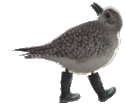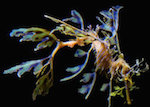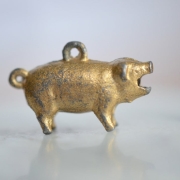|
Mr.Pibbleton posted:I remember this one Aleut expert had a problem with the way the basics where being taught, specifically they were teaching primary colors, green, blue purple etc. The problem is in Yupik languages there's only THREE primary colors, light, dark and red. If you want to describe something by color you have to compare it to the color of something else. To resurrect this a little, this is part of a fascinating trend of how different cultures define color: http://www.wired.com/2012/06/the-crayola-fication-of-the-world-how-we-gave-colors-names-and-it-messed-with-our-brains-part-i/ article posted:And here’s what they found. Languages have differing numbers of color words, ranging from two to about eleven. Yet after looking at 98 different languages, they saw a pattern. It was a pretty radical idea, that there is a certain fixed order in which these color names arise. This was a common path that languages seem to follow, a road towards increasing visual diversity.
|
|
|
|

|
| # ? Apr 16, 2024 11:43 |
|
fuzzy_logic posted:To resurrect this a little, this is part of a fascinating trend of how different cultures define color: http://www.wired.com/2012/06/the-crayola-fication-of-the-world-how-we-gave-colors-names-and-it-messed-with-our-brains-part-i/ Oh yeah and when two different languages combine it can mess with the primary colors, I forget which African language is a combination of two different tribes with different primary colors, but they actually LOST the term for yellow and the expression they use is, "red like a banana." Was talking about about this with a Japanese guy about Japanese about different primary colors and it blew his mind when he realized that in Japanese they describe a traffic signal turning green as "Aoni naru" which actually means it turned blue.
|
|
|
|
This looks cool: http://neveralonegame.com/quote:Welcome to the top of the world.
|
|
|
|
Yeah, I'm getting it!
|
|
|
|
Been awhile but, Never Alone(Kisima Ingitchuna) is out and it's on sale http://store.steampowered.com/app/295790/
|
|
|
|
How long do think the current village model will last? When I look at place like Kwethluk or Wales or Crooked Creek, I can't see the lasting as viable communities based on the massive costs to keep each community supplied with modern infrastructure. Powerplants and electric grids are almost a million dollars each and burn diesel, water and sewer systems cost 5 million plus are very expensive to run if there's lift stations involved and expensive maintenance, roads are a million dollars a mile due to gravel costs, plus mobilization costs for construction are ungodly high, schools run about 25 million at least for places like Koliganek and the state is on the hook build several more due to the Kasayulie case, plus whatever health clinic and village city offices cost to build and maintain. Then there's housing, mostly paid for by HUD, and those run 250-300k each due to the remoteness of the bush communities. Looking at Newtok, the estimated cost to move to the new site of Mertarvik is at least 100 million dollars. 100 million dollars to recreate a village for 350 people is a steep price. Then you have operational costs, most of which aren't covered by user fees or any tax at the local level, since there's effectively no economy or tax base in the communities. The state is essentially broke once you factor in pension/healthcare costs and oil production is going down regardless of any new tax and/or investment schemes, so that means less money overall. As the bulk of the population continues to live in the railbelt and the political power moves accordingly, the villages' political clout will decline accordingly as will their ability to get money from the state. When the clamor for public safety in each village arises, and it should, there's no mechanism to pay for it. Where's the money going to come from? The cost to put Troopers in each villages would be astronomical once you factor in the trooper pay, housing, vehicles and any jail/holding cell. People rightly point out that the state wastes tons of money on study after study after study for mega projects that will never materialize, but that doesn't change the underlying problems of a bush community. Also, the feds aren't exactly flush, either, and they don't have the best track record of keeping promises with natives, to say the least. It's a pretty negative outlook from a financial perspective. I understand that the villages came about haphazardly overtime due to western government and paternalism, ANSCA, and a weird dual state/federal funding model that differs from reservations, but I can't see the bulk of them being there as permanent, year-round communities in 20 years, especially in the smaller communities. Once the school closes due to lack of enrollment, it starts a chain reaction and the community goes into a death spiral. What are your thoughts on this? Do you see a future for most of the bush communities?
|
|
|
|
I Drink Stove Oil posted:How long do think the current village model will last? When I look at place like Kwethluk or Wales or Crooked Creek, I can't see the lasting as viable communities based on the massive costs to keep each community supplied with modern infrastructure. Powerplants and electric grids are almost a million dollars each and burn diesel, water and sewer systems cost 5 million plus are very expensive to run if there's lift stations involved and expensive maintenance, roads are a million dollars a mile due to gravel costs, plus mobilization costs for construction are ungodly high, schools run about 25 million at least for places like Koliganek and the state is on the hook build several more due to the Kasayulie case, plus whatever health clinic and village city offices cost to build and maintain. Then there's housing, mostly paid for by HUD, and those run 250-300k each due to the remoteness of the bush communities. Looking at Newtok, the estimated cost to move to the new site of Mertarvik is at least 100 million dollars. 100 million dollars to recreate a village for 350 people is a steep price. Then you have operational costs, most of which aren't covered by user fees or any tax at the local level, since there's effectively no economy or tax base in the communities. The native corporations actually do a lot to get money out to the villages and have programs that get healthcare professionals out there. They do a lot, but severe poverty is pretty endemic in the remote areas. Cordova is doing ok since it has the fishing industry and timber to sustain it, but the town used to be a lot richer back when it had an army base and the rails from the copper river mine. The state of the villages is pretty depressing and the suicide rate up there is pretty drat high. Food prices are so high that subsistence hunting/fishing is pretty drat necessary out there which is why climate change is a huge concern. I wouldn't be surprised to see some of the remote communities disappear by being absorbed by other communities or just having so many people move to the cities. I don't know how the Russian villages are handling it either.
|
|
|
|
Mr.Pibbleton posted:The native corporations actually do a lot to get money out to the villages and have programs that get healthcare professionals out there. They do a lot, but severe poverty is pretty endemic in the remote areas. Cordova is doing ok since it has the fishing industry and timber to sustain it, but the town used to be a lot richer back when it had an army base and the rails from the copper river mine. The state of the villages is pretty depressing and the suicide rate up there is pretty drat high. Food prices are so high that subsistence hunting/fishing is pretty drat necessary out there which is why climate change is a huge concern. I wouldn't be surprised to see some of the remote communities disappear by being absorbed by other communities or just having so many people move to the cities. I don't know how the Russian villages are handling it either. Oops, left out the native corps by accident; some can afford to put a lot of money/resources towards their villages but a lot can't. I've been to communities where the village corp has an active presence and others where it's a one man office and PO box somewhere in Anchorage. I met a lot of people who grew up in a village and were helped out financially from their village/regional corp for their schooling but never went back to the village; a few dedicated and educated people can make a big difference in small community. Places like Cordova and Unalaska will be okay in the long run, I think, as they have an economy. Places like Platinum or Kasigluk aren't looking so hot. The high cost of food will definitely play a part; subsistence, however one wants to define it, is pretty goddamn expensive when a honda costs 7-8k and a skiff plus gear costs the same. But if the villages depopulate and move towards the Nomes and Bethels of the state, then the pressure on the environment to sustain the subsistence demands becomes that much greater on a smaller area. I have no idea on how it works in Russia, but the people that I have spoken with who have been to the far eastern part don't give it glowing reviews. Do you think that Walker and Mallot will make a positive difference for the bush and the native population, or are the challenges facing the bush beyond the state government's control? What's your opinion on Chugachmiut?
|
|
|
|
I Drink Stove Oil posted:
I certainly hope they'll help, but a lot of time government assistance tends to be short sighted and not address long term problems. I'm afraid I don't know enough about the bush to really talk with much authority on it, I've talked to people from out there but I'm from Cordova. Cordova's corporation is the Eyak Village corporation so I've had no dealings with Chugachmiut.
|
|
|
|
This might be kinda far from your home town but you'd know a shitton more about it than me even so. I've got an internship opportunity in Sitka, AK in the spring. Is there anything you can tell me about the place?
|
|
|
|
Grand Prize Winner posted:This might be kinda far from your home town but you'd know a shitton more about it than me even so. I've got an internship opportunity in Sitka, AK in the spring. Is there anything you can tell me about the place? Never been down there myself, but I know it's small town and it rains a lot, most of the stuff to do is probably going to be outdoors, it's in the archipelago though so if you've got a few days off you can go check out some islands nearby. Don't think it gets that cold down there, just invest in some good rain gear and you should be fine. If you have any questions about anything there try to find an old retired guy who hangs out drinking coffee in a building related to the question, he'll tell you everything you want to know and then some.
|
|
|
|
Pibbs, have you seen the arctic episode of Human Planet? It's this cool series by the same people who did Blue Planet but about people in different climates / extreme living situations and how they adapt. These are the episodes: http://www.bbc.co.uk/programmes/b00llpvp/episodes/guide there's some clips there, and they air on BBc America sometimes. The one about the arctic covers some reindeer herding and stuff in Scandanavia and then follows some native people in Greenland while they hunt narwhal and some other folks in Canada (Kangiqsujuaq) who go under the ice when the lowest tide goes out at the full moon, and they have to gather mussels and shellfish before the tide comes rushing back in and kills them all. That part was terrifying.
|
|
|
|
fuzzy_logic posted:Pibbs, have you seen the arctic episode of Human Planet? It's this cool series by the same people who did Blue Planet but about people in different climates / extreme living situations and how they adapt. These are the episodes: http://www.bbc.co.uk/programmes/b00llpvp/episodes/guide there's some clips there, and they air on BBc America sometimes. Oh man I've never heard of ice rush gathering, that sounds super freaky.
|
|
|
|
Mr.Pibbleton posted:Oh man I've never heard of ice rush gathering, that sounds super freaky. Chiming in to say I've watched a doco that had this stuff happening too. As someone who has done a bit of exploratory limestone caving I can tell you gently caress that noise. The idea of having a cave that will trap you from escaping with the water rising to cut you off, the roof above you melting to cut you off and / or just straight up getting lost and dying down there left me with sweaty palms just watching it. In the doco I watched this guy was the only one left in his tribe who still did it because it was too crazy for everyone else.
|
|
|
|
Make friends with someone who lives on the islands, their houses are cool as hell and have amazing views. Sitka is amazing and has a few surprisingly great restaurants.
|
|
|
|
Merry Christmas everybody. https://www.youtube.com/watch?v=zVF6DQGh8Ic
|
|
|
|
Hi Alaskgoons, a Calgary dweller here living down in your rightful homeland of Canada. I can sympathize with the igloo thing - I've been asked all kinds of weird poo poo by my in-laws when I go visit them in the UK. The best thing is just to make up bullshit stories. I like to tell them that we are given a companion moose at birth who stays with us and teaches us the ways of the world until we reach adulthood, at which point they return to the wilderness. I am just wondering if Alaskan Natives suffered from a residential school system like the First Nations here did up until the 60s? What are historical relations like between Native and non-Native populations?
|
|
|
|
To Aethersphere's point specifically, this memoir talks about the writer's education; he was born in the 1940s. And in general, I recommend it as a good read.
|
|
|
|
Aethersphere posted:I am just wondering if Alaskan Natives suffered from a residential school system like the First Nations here did up until the 60s? Well the school I went to was pretty drat good(we had programming classes and 586's in the early 90's!). However a lot of kids were taken away from their families to be "educated" with the assumption they'd come back as doctors and engineers but instead they were beaten every time they spoke their native language so more than a few elders can understand their tribe but they can't actually speak in that tongue any more. Now we have a lot of programs working on preserving the Yup'ik languages and making sure kids know it. Aethersphere posted:What are historical relations like between Native and non-Native populations? Going by my personal experiences I'd say... White/Native relations are pretty good, Asian/Native are also good, probably because there is some resemblance between the two, Indian/Native mutual bemusement, Hispanic/Native seems to be just fine, Black/Native seems to range from pretty racist against Black people to worship of the Harlem Globetrotters. Aethersphere posted:Hi Alaskgoons, a Calgary dweller here living down in your rightful homeland of Canada. I can sympathize with the igloo thing - I've been asked all kinds of weird poo poo by my in-laws when I go visit them in the UK. The best thing is just to make up bullshit stories. I like to tell them that we are given a companion moose at birth who stays with us and teaches us the ways of the world until we reach adulthood, at which point they return to the wilderness. We will never betray the true Wu-Tang secret to the Sunlanders.
|
|
|
|
Aethersphere posted:I am just wondering if Alaskan Natives suffered from a residential school system like the First Nations here did up until the 60s? What are historical relations like between Native and non-Native populations? Not all of the schools were like that - though many of them were godawful - but he also said that even friends he had that went to better schools were forced to not use their language and were often tracked directly into a vocational path, regardless of skill, talent, or disposition. You could also be sent out to boarding homes - these operations were not monitored too closely, and there was a lot of trouble. Not just abuse, mind, but just teenagers being teenagers in a new and lonely place, or a family being filled with plain assholes. It was equally lovely with where you could be sent, with students sometimes being sent to a larger town in the region or being sent to the lower 48 under a sort of vague idea of "ehhhh they're all Indians, right?" The whole thing eventually got slammed down in the Molly Hootch case, where a number of Alaskan Native students and their parents sued, arguing that the current system amounted to educational discrimination. The final settlement was pretty damning of the whole system, and essentially laid down how big a school was to be provided in a village, relative to the number of students and other factors - no longer would students get tossed all over the place, but instead you'd have a school right in the community. If you want a more in depth breakdown of the abuse, this article provides more information. One of the lines - about it being safer in Vietnam than Beltz - comes from my professor or one of his close friends. I heard it repeated in person, though I forget who he attributed it to. For the Molly Hootch case, I recommend this as an excellent rundown. As for the historical relations, I honestly can't speak too far back. I do know that, in 1945, the territory did pass an Anti-Discrimination Bill (in large part due to the advocacy and lobbying of Elizabeth Peratrovich, who laid some sick goddamn burns on the Legislature when some dudes starting talking about "savagery" and the like, and Alberta Schenck, who pulled a small-scale non-violent sit-in sort of deal off in Nome and helped shove discrimination back into the public light again) which nominally ended racial discrimination. However, we all know that there is a big gap between signing a bill and what happens on the ground - while the Territory and State could, and did, enforce its laws and regulations, there was still a poo poo ton of racism. My aforementioned professor had a whole string of colorful names he would be called trying to board a bus by a driver up in Nome. Mr.Pibbleton is right about current relations (in my experience) though you still get racial tension between Whites and Natives depending on where you're at (or even what side of Anchorage you're in.) In my experience, it's almost always directed from old Whites to Natives, normally relating to Natives drinking too much, eating weird things, or bitching about "WHY DO THEY GET FREE HEALTHCARE?" Sometimes it takes a more sinister turn, like when you get store security profiling Alaskan Natives and shadowing them through the store. I think it's a portion of the older generation that just hasn't moved on, since I hear it very little from younger people. As an aside, I recommend Alaskool for anyone interested in Alaskan history, specifically with an emphasis on education or race relations. A lot of excellent people contributed to building that site. Von Humboldt fucked around with this message at 08:35 on Dec 26, 2014 |
|
|
|
I would love to read more stories about life in rural Alaska! A friend lived in a village in Nunavut for a few years while researching polar bears. She said that rather than sitting down to large meals, people would snack throughout the day, usually on meat such as seal liver. She also said if there were seals or whales nearby, people would definitely be hunting rather than going to work or school on those days! Is this something that you see or experience too? I know she was in a pretty isolated area where there was a lot of subsistence hunting.
|
|
|
|
aequorea posted:I would love to read more stories about life in rural Alaska! We do a lot of subsistence hunting and fishing but it doesn't interfere with school or work. During the summer when I was on my family's fishing boat when there weren't any openers (periods in an area where it was legal to commercially fish 6-48 hours long) we'd be out gathering some kind of food or mending nets. I've spent a lot of time gathering berries and looking for clams, I don't personally dig for clams because I tend to break the shovels and nobody can tell what I'm doing wrong but it keeps on happening.  I was the best in the family at diving for freshwater clams though! Those disposable knit bags that oranges sometimes come in are awesome for clam diving. I was the best in the family at diving for freshwater clams though! Those disposable knit bags that oranges sometimes come in are awesome for clam diving.
|
|
|
|
aequorea posted:I would love to read more stories about life in rural Alaska! There really isn't much steady 9-5/40 hours a week work in most of the smaller villages, so taking time off to hunt or fish isn't much of an issue. The guy who maintains the power plant isn't working 8-5 at that job, so he can do his 2-3 hours in the morning and then go off and hunt or fish for the rest of the day or stay out longer if he can find someone to cover for him. Same with the lady who runs the post office or plows the runway. This is even more evident once freeze up hits and any construction projects like work on a new water plant or housing comes to an end and the seasonal workers aren't working in the cash economy and move to the subsistence economy. Aethersphere posted:I am just wondering if Alaskan Natives suffered from a residential school system like the First Nations here did up until the 60s? What are historical relations like between Native and non-Native populations? Yeah, as mentioned it was pretty much a disaster all around, including the natives who were sent to live with season 'foster' families in bigger cities during the school year. I worked with a guy who was in his mid-60's and sent away and then drafted into the army during Vietnam. He came out pretty messed up and struggled for a long time from both experiences, but eventually pieced life back together and is now respected elder in his community. Still, when certain topics would come up there was definitely an undercurrent of.... bitterness? in his voice.
|
|
|
|
Antivehicular posted:On that subject, if it's not too meta for an Ask/Tell thread: what's the stupidest question a non-Alaskan has ever asked you about living in Alaska? Mine was probably the afternoon in eighth grade where some kid spent the entire bus ride home from school naming fast-food restaurants and asking if we had those in Alaska. The revelation that, yes, we had McDonald's, but no, we didn't have Runza (and what the christ is a Runza?) seemed strangely unsatisfying to her. I don't like to get in the way of REAL ALASKA talk because I'm a city slicker, but no one out of the state knows the difference, so I've managed to convince people we keep a stable of riding bears for the daily commute and that the reason I always wore my sunglasses wasn't because i'm a douche but because my alaskan eyes weren't acclimated to daylight. Sunlanders, am I right? 
|
|
|
|
PopeCrunch posted:I don't know, I dug it. I had a gig doing home inspections for insurance companies, so I got sent a few other places in AK on business - Sitka was similarly gorgeous, but Anchorage was just enh. Juneau was PERFECT. I don't know where you live, but odds are good I'd gladly trade you. You can take the constant rain and the lack of decent restaurants and the one-road bar scene and all the lovely Alaskan beer you want.
|
|
|
|
Epoxy Bulletin posted:I don't like to get in the way of REAL ALASKA talk because I'm a city slicker, but no one out of the state knows the difference, so I've managed to convince people we keep a stable of riding bears for the daily commute and that the reason I always wore my sunglasses wasn't because i'm a douche but because my alaskan eyes weren't acclimated to daylight. Sunlanders, am I right? "Y'all just put an outboard on an igloo and it's like a motorhome for y'all right?" It was funny the first time but the humor diminished considerably by the fifth time. Mr.Pibbleton fucked around with this message at 06:19 on Feb 5, 2015 |
|
|
|
I think my favorite was the time I picked up a pair of german backpackers hitching back from Girdwood, and while making small talk I mentioned the termination dust was coming down early this year. They exchanged worried looks and asked if we could pull over at the next place that might have breath masks.
|
|
|
|
Epoxy Bulletin posted:I think my favorite was the time I picked up a pair of german backpackers hitching back from Girdwood, and while making small talk I mentioned the termination dust was coming down early this year. They exchanged worried looks and asked if we could pull over at the next place that might have breath masks. I'd be pretty freaked out too if someone said that. Just had to Google it before finding out you just meant first snowfall. Belting along the road with a random who just picked me up would have made that a bit harder.
|
|
|
|
Epoxy Bulletin posted:I don't like to get in the way of REAL ALASKA talk because I'm a city slicker, but no one out of the state knows the difference, so I've managed to convince people we keep a stable of riding bears for the daily commute and that the reason I always wore my sunglasses wasn't because i'm a douche but because my alaskan eyes weren't acclimated to daylight. Sunlanders, am I right? If you would've told me this I would've completely believed it too
|
|
|
|
Evil Sagan posted:I don't know where you live, but odds are good I'd gladly trade you. You can take the constant rain and the lack of decent restaurants and the one-road bar scene and all the lovely Alaskan beer you want. Just north of Washington DC. Almost as expensive to live in, but nowhere near as gorgeous. The closest we have to decent beer is Yuengling, which is serviceable enough, but it ain't no Alaskan. Still wanna trade? Because I can start packing right now...
|
|
|
|
drat it, I missed seeing this thread and posted a separate one with this question. Maybe the Alaska-knowledge-havers in here will be kind enough to answer.  bonestructure posted:I've been offered a job in Whittier, AK, a tiny town of a couple of hundred people way out in the hinterland. It has a couple of peculiarities; there is one giant brutalist building that nearly everyone in town lives in and which contains the city hall, police dept, grocery store, etc. The other weird thing is that Whittier is only accessible by land through one of the longest combined rail-car tunnels in existence, which is frequently closed in the winter for months at a time due to snow. (the Prime thing is a joke)
|
|
|
|
I lived in South East, but a friend of mine's family moved to Whittier for a bit and described as a frozen, hostile hellscape. Not sure if it's entirely true, but they said the military base was placed there because the weather is so awful radar can't penetrate. EDIT: And these weren't soft sunlanders, they lived happily in SEA for years and eventually settled in Valdez.
|
|
|
|
I got Never Alone! (And stopped playing for a bit when I found out the fox has a heartbreaking death animation that was upsetting my dog). I found out some Inupiat domesticate arctic foxes. Were any other animals ever domesticated up there? I know the Scandanavian people herd reindeer, which are similar if not the same as caribou, so why did that never catch on in North America? And knitting doesn't seem to have either, I guess without any animals that grow wool.
|
|
|
|

|
| # ? Apr 16, 2024 11:43 |
|
bonestructure posted:drat it, I missed seeing this thread and posted a separate one with this question. Maybe the Alaska-knowledge-havers in here will be kind enough to answer. Whittier isn't really out in the hinterlands, it's about 90 minutes or so from Anchorage on a good day, minus any time spent waiting at the tunnel. The waits can be pretty long in the summer and whenever a ferry arrives and dumps off all the people there's a long wait to go outbound. The Seward Highway isn't the safest road and wrecks can shut it down even on a good weather day, but you can't really plan for that. The tunnel shuts down at night, so there's always that to keep in mind, and heavy snows will close the access road for avalanche control. You're right that almost everyone lives in the same building, so it's got that going for it, for better or worse. There's always lots of units for sale and rent in the building; finding a place to stay shouldn't be hard. You might call a relator to see if someone looking to sell will rent out their place . There ain't much to do in Whittier besides drink and fish and other outdoors stuff. Cell Phones work there, but I only had a GCI phone whenever I was there, so other providers might not work, but I think ATT will work fine there. I'm not sure about internet there since GCI internet doesn't serve there, apparently Yukontel is the local ISP. Going to Costco or Fred Meyer in Anchorage is your best bet food wise, except for whatever you can get from the ocean. Find someone with a boat and tossing them gas money would be a good way to get out and see the area, but make sure you have your fishing license. What, generally, would your job be?
|
|
|





















